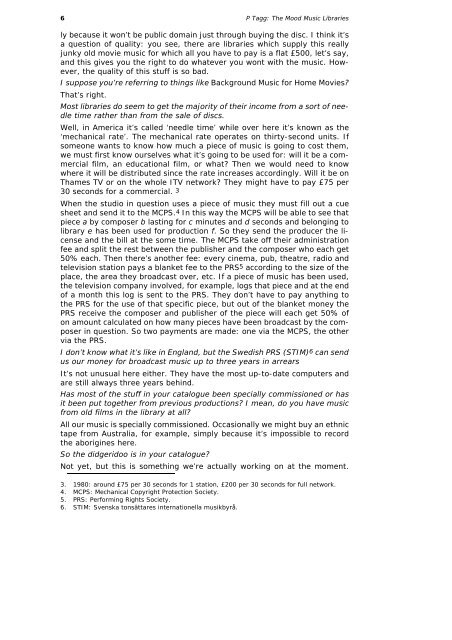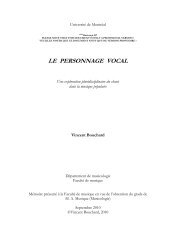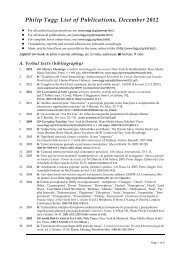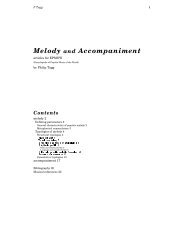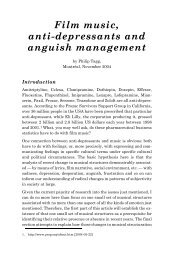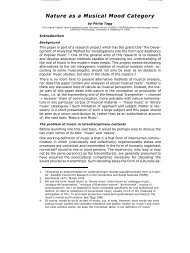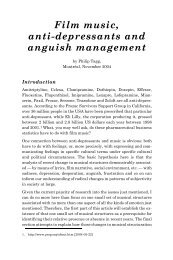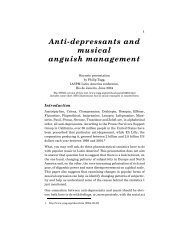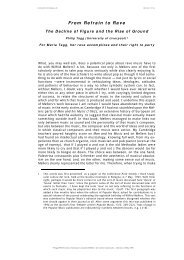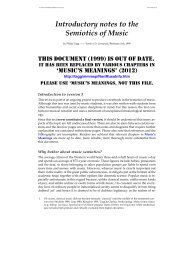interviews with library music producers - Philip Tagg
interviews with library music producers - Philip Tagg
interviews with library music producers - Philip Tagg
Create successful ePaper yourself
Turn your PDF publications into a flip-book with our unique Google optimized e-Paper software.
6 P <strong>Tagg</strong>: The Mood Music Libraries<br />
ly because it won’t be public domain just through buying the disc. I think it’s<br />
a question of quality: you see, there are libraries which supply this really<br />
junky old movie <strong>music</strong> for which all you have to pay is a flat £500, let’s say,<br />
and this gives you the right to do whatever you wont <strong>with</strong> the <strong>music</strong>. However,<br />
the quality of this stuff is so bad.<br />
I suppose you’re referring to things like Background Music for Home Movies?<br />
That’s right.<br />
Most libraries do seem to get the majority of their income from a sort of needle<br />
time rather than from the sale of discs.<br />
Well, in America it’s called ‘needle time’ while over here it’s known as the<br />
‘mechanical rate’. The mechanical rate operates on thirty-second units. If<br />
someone wants to know how much a piece of <strong>music</strong> is going to cost them,<br />
we must first know ourselves what it’s going to be used for: will it be a commercial<br />
film, an educational film, or what? Then we would need to know<br />
where it will be distributed since the rate increases accordingly. Will it be on<br />
Thames TV or on the whole ITV network? They might have to pay £75 per<br />
30 seconds for a commercial. 3<br />
When the studio in question uses a piece of <strong>music</strong> they must fill out a cue<br />
sheet and send it to the MCPS.4 In this way the MCPS will be able to see that<br />
piece a by composer b lasting for c minutes and d seconds and belonging to<br />
<strong>library</strong> e has been used for production f. So they send the producer the license<br />
and the bill at the some time. The MCPS take off their administration<br />
fee and split the rest between the publisher and the composer who each get<br />
50% each. Then there’s another fee: every cinema, pub, theatre, radio and<br />
television station pays a blanket fee to the PRS5 according to the size of the<br />
place, the area they broadcast over, etc. If a piece of <strong>music</strong> has been used,<br />
the television company involved, for example, logs that piece and at the end<br />
of a month this log is sent to the PRS. They don’t have to pay anything to<br />
the PRS for the use of that specific piece, but out of the blanket money the<br />
PRS receive the composer and publisher of the piece will each get 50% of<br />
on amount calculated on how many pieces have been broadcast by the composer<br />
in question. So two payments are made: one via the MCPS, the other<br />
via the PRS.<br />
I don’t know what it’s like in England, but the Swedish PRS (STIM)6 can send<br />
us our money for broadcast <strong>music</strong> up to three years in arrears<br />
It’s not unusual here either. They have the most up-to-date computers and<br />
are still always three years behind.<br />
Has most of the stuff in your catalogue been specially commissioned or has<br />
it been put together from previous productions? I mean, do you have <strong>music</strong><br />
from old films in the <strong>library</strong> at all?<br />
All our <strong>music</strong> is specially commissioned. Occasionally we might buy an ethnic<br />
tape from Australia, for example, simply because it’s impossible to record<br />
the aborigines here.<br />
So the didgeridoo is in your catalogue?<br />
Not yet, but this is something we’re actually working on at the moment.<br />
3. 1980: around £75 per 30 seconds for 1 station, £200 per 30 seconds for full network.<br />
4. MCPS: Mechanical Copyright Protection Society.<br />
5. PRS: Performing Rights Society.<br />
6. STIM: Svenska tonsättares internationella musikbyrå.


